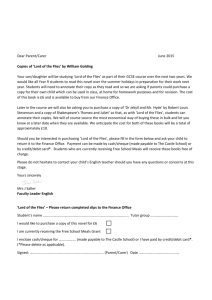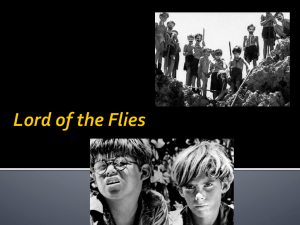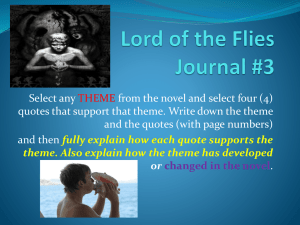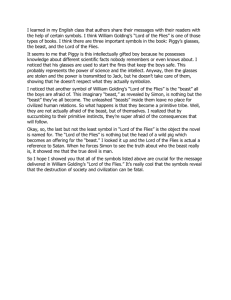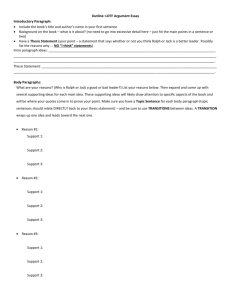Lord of the Flies Theme arguments
advertisement
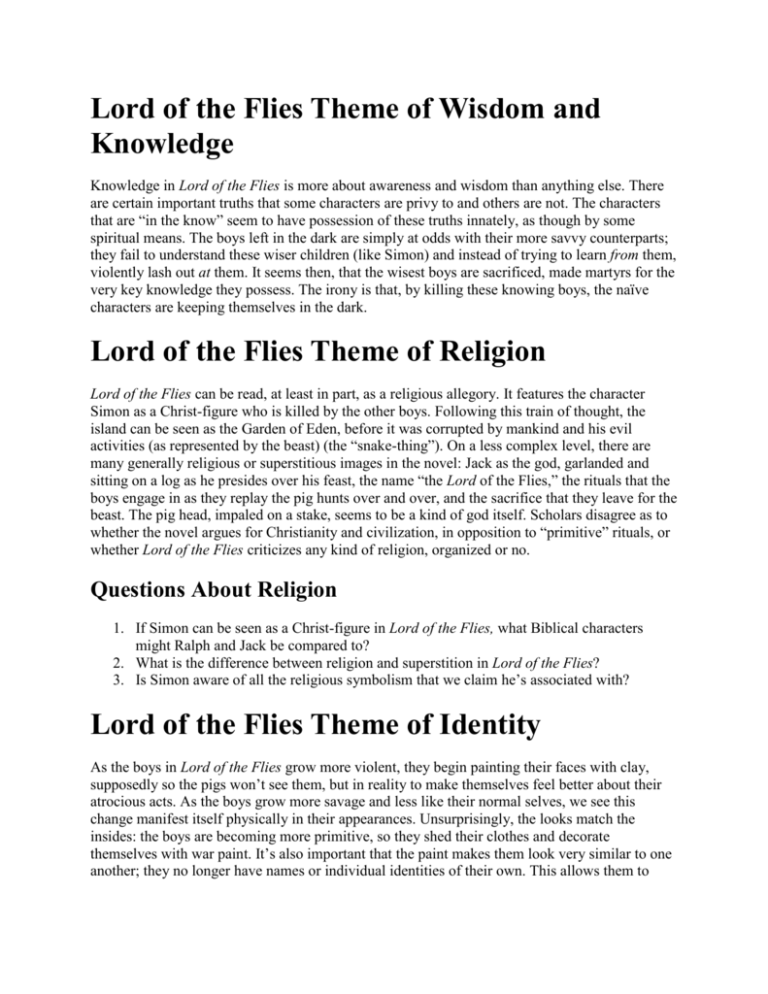
Lord of the Flies Theme of Wisdom and Knowledge Knowledge in Lord of the Flies is more about awareness and wisdom than anything else. There are certain important truths that some characters are privy to and others are not. The characters that are “in the know” seem to have possession of these truths innately, as though by some spiritual means. The boys left in the dark are simply at odds with their more savvy counterparts; they fail to understand these wiser children (like Simon) and instead of trying to learn from them, violently lash out at them. It seems then, that the wisest boys are sacrificed, made martyrs for the very key knowledge they possess. The irony is that, by killing these knowing boys, the naïve characters are keeping themselves in the dark. Lord of the Flies Theme of Religion Lord of the Flies can be read, at least in part, as a religious allegory. It features the character Simon as a Christ-figure who is killed by the other boys. Following this train of thought, the island can be seen as the Garden of Eden, before it was corrupted by mankind and his evil activities (as represented by the beast) (the “snake-thing”). On a less complex level, there are many generally religious or superstitious images in the novel: Jack as the god, garlanded and sitting on a log as he presides over his feast, the name “the Lord of the Flies,” the rituals that the boys engage in as they replay the pig hunts over and over, and the sacrifice that they leave for the beast. The pig head, impaled on a stake, seems to be a kind of god itself. Scholars disagree as to whether the novel argues for Christianity and civilization, in opposition to “primitive” rituals, or whether Lord of the Flies criticizes any kind of religion, organized or no. Questions About Religion 1. If Simon can be seen as a Christ-figure in Lord of the Flies, what Biblical characters might Ralph and Jack be compared to? 2. What is the difference between religion and superstition in Lord of the Flies? 3. Is Simon aware of all the religious symbolism that we claim he’s associated with? Lord of the Flies Theme of Identity As the boys in Lord of the Flies grow more violent, they begin painting their faces with clay, supposedly so the pigs won’t see them, but in reality to make themselves feel better about their atrocious acts. As the boys grow more savage and less like their normal selves, we see this change manifest itself physically in their appearances. Unsurprisingly, the looks match the insides: the boys are becoming more primitive, so they shed their clothes and decorate themselves with war paint. It’s also important that the paint makes them look very similar to one another; they no longer have names or individual identities of their own. This allows them to shed their civilized selves and become nameless creatures that kill and murder. They feel no need to control themselves, since they no longer have “selves” to control. Questions About Identity 1. What does the face-painting have to do with the boys becoming more violent? 2. Are the boys reverting to their true identities on the island, or leaving their true identities behind as they become more primitive? How does Simon identify the pig’s head? What does he mean when he thinks “the Lord of the Flies?” Does he even know? Theme as Explained by the Author . In a publicity release prepared for American publishers of The Lord of the Flies, William Golding explained the theme of his book as follows: The theme is an attempt to trace the defects of society back to the defects of human nature. The moral is that the shape of a society must depend on the ethical nature of the individual and not on any political system however apparently logical or respectable. The whole book is symbolic in nature except the rescue in the end where adult life appears, dignified and capable, but in reality enmeshed in the same evil as the symbolic life of the children on the island. The officer, having interrupted a man-hunt, prepares to take the children off the island in a cruiser which will presently be hunting its enemy in the same implacable way. And who will rescue the adult and his cruiser? (E.L. Epstein. "Notes on Lord of the Flies." The Lord of the Flies, by William Golding. New York: Berkley Publishing Group, 1954, Page 204)
